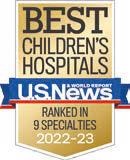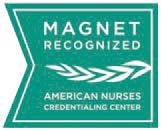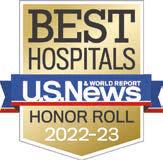Fetal Diagnosis and Treatment Center



• Michigan Medicine is one of just a few medical centers nationwide where Labor and Delivery is nestled within a comprehensive children’s hospital.



• Our Fetal Diagnosis and Treatment Center offers comprehensive prenatal diagnosis and cutting-edge treatment.
• Being under one roof provides the optimal environment for fetal therapy and surgery.


• Care for high-risk pregnant women is integrated, cohesive, caring and supportive. Once babies are born, family members remain together, allowing for continued family-focused care.

• We offer seamless care from fetal life through adulthood, focused on optimizing long-term outcomes and quality of life.
• After delivery, families are connected with our multidisciplinary longitudinal follow-up clinics.
• Our cohesive, well-established, experienced team is comprised of members who are recognized as international leaders in prenatal diagnosis and fetal therapy.
• Our team has worked together since 2006. New team members continue to bring innovation, cutting-edge research, and patient-focused care.
Fetal Diagnosis and Treatment Center, we are committed to providing comprehensive, coordinated and compassionate care for both women and infants.
• In a caring environment, the Fetal Diagnosis and Treatment Center offers the full spectrum of care, including comprehensive diagnostic screening and testing, prenatal care and pregnancy management, extensive counseling, and all available fetal interventions and surgeries.
• Our top priorities are outstanding care, multidisciplinary collaboration and innovation. During pregnancy, families meet with all of the necessary specialists to help understand the conditions and available management options.
• Providing care in an integrated women’s and children’s hospital optimizes care for women and infants. In particular, high-risk deliveries are performed in an operating room with an adjacent state-of-the-art, fully operational newborn evaluation, stabilization and treatment (NEST) room. Every room is single patient, fully equipped and built around family-centered care, with immediate access to operating rooms, catheterization labs and advanced imaging modalities.
• Our maternal fetal medicine physicians, pediatric surgeons, and neonatologists are ranked among the best in the nation and are available around the clock for consultations, referrals, and complex deliveries.
• Our Congenital Heart Center, consistently ranked as one of the best in the nation, is co-located within the building for easy access to cardiology services.
• As the birthplace of Extracorporeal Membrane Oxygenation (ECMO) in 1980, we remain leaders and innovators in extracorporeal support.
• We are leaders in clinical, basic science, and translational research to optimize outcomes for women and infants.

At Michigan Medicine, our interprofessional team works together to provide an individualized treatment plan that includes high-risk pregnancy management, fetal intervention when indicated, delivery planning, and postnatal care and treatment.
Specialized Obstetric, Operating Room, ICU Nursing
Social Work
Nurse Coordination
Child and Family Life
Maternal
Fetal Medicine
Pediatric Surgery
Neonatology
Financial Counseling
Palliative Care
Genetic Counseling Sonography
Adult and Pediatric Genetics
Pediatric Otolaryngology (ENT)
Oral Maxillofacial Reconstructive Surgery
Pediatric Neurosurgery
Pediatric and Fetal Radiology
Pediatric Cardiology
Pediatric Neurology
Plastic Surgery
Pediatric Urology
Pediatric Cardiothoracic Surgery
Obstetric and Pediatric
Anesthesiology
Our expert team offers the full range of fetal procedures and surgeries to diagnose and treat conditions prior to birth. From initial fetal screening to highly complex fetal interventions and delivery management, our experienced team uses minimally invasive techniques as well as open fetal surgery.
Our commitment to excellence includes rigorous simulation and training, thoughtful care coordination, ongoing quality assurance, and data monitoring.
• Fetoscopic laser for twin-twin transfusion syndrome
• Fetoscopic treatment of amniotic bands
• Fetal blood sampling (cordocentesis) and intrauterine blood transfusion
• Ultrasound-guided umbilical cord administration of medications
• Fetal cardiac aortic valvuloplasty
• Fetal cardiac atrial septostomy
• Fetal skin or muscle biopsy
• Ultrasound-guided percutaneous shunt placement: vesicoamniotic and thoracoamniotic shunts
• Radiofrequency ablation (twin reversed arterial perfusion (TRAP) and complicated monochorionic twins)
• Fetal endoscopic tracheal occlusion (FETO) for severe congenital diaphragmatic hernia (CDH)


• Ex Utero Intrapartum Treatment (EXIT) for airway obstruction, mass/tumor resection, or to ECMO
• Open fetal surgery for myelomeningocele repair
• Open fetal surgery for tumor resection (e.g., sacrococcygeal teratoma)
At Michigan Medicine, we strive for a patient-centered culture where patients and families are empowered to have a voice.
Our Patient and Family Centered Care program supports care that recognizes and respects the uniqueness of each family and encourages families to partner with health care providers. Designed by families and health care providers, our Family Center is a place where patients and families can learn, relax and become advocates for their health care. Overall, the four concepts of Patient and Family Centered Care are:
• Dignity and respect
• Information sharing
• Collaboration
• Participation
• Detailed care coordination for patients while at Michigan Medicine
• Social work
• Breastfeeding and lactation support

• Spiritual care
• Travel and lodging coordination and support for families

• On-site and off-site Ronald McDonald House locations

• Comprehensive care plans and communication with referring providers when patients return to their primary care provider and/or institution

Our team aims to drive improvements in maternal and fetal outcomes and to develop therapies for generations to come. We have a deep passion for exploring diverse and complex conditions that have lifelong implications for both maternal and fetal health.
• Our team aims to understand the role of placental efflux transporters in fetal opioid exposure.
• Alongside national and state partners, and using innovative technologies, we are leading efforts to improve maternal safety, build perinatal collaboratives, and reduce healthcare disparities.

• We are studying obstetric and neonatal outcomes as well as patient satisfaction in the population of women admitted for extended antepartum stays.
• Our team is focused on creating novel strategies to enhance support offered to this population.
• Pioneering strategies to support healthy oxygen delivery in newborns of extremely low gestational age or newborns requiring postnatal surgery.
• NIH-funded researchers are working to improve sur vival rates in the tiniest, most premature babies in a groundbreaking way. Our innovative artificial placenta mimics the intrauterine environment, providing gas exchange without mechanical ventilation.
• Recreating the intrauterine environment will allow critical organ development outside of the uterus. Next steps will be to determine if milestones justify preliminary clinical trials in extremely premature babies.
• For the past few years, our team has been investigating novel techniques to enter the uterus for open fetal surgery.
• Our animal studies are showing that use of the Harmonic ACE+7 to create a hemostatic hysterotomy is safe. Additionally, healing is similar to traditional stapling.
Fetal Endoscopic Tracheal Occlusion (FETO) for Congenital Diaphragmatic Hernia (CDH)
• Fetal Endoscopic Tracheal Occlusion (FETO) is offered at Michigan Medicine.
• This experimental therapy is offered for fetuses with severe pulmonary hypoplasia with liver in the thoracic cavity due to congenital diaphragmatic hernia (CDH), including right- or left-sided defects.
• We are active members and participants in the North American Fetal Therapy Network (NAFTNet), a multicenter network of 36 medical centers in the United States and Canada that perform advanced in-utero fetal therapeutic procedures.
• We are actively involved in collaborative research projects, registries, and publications with NAFTNet, including complicated monochorionic twin gestations, open myelomeningocele repair registry, mode of delivery for fetuses with myelomeningoceles, and sleep-disordered breathing in neonates with myelomeningocele.

